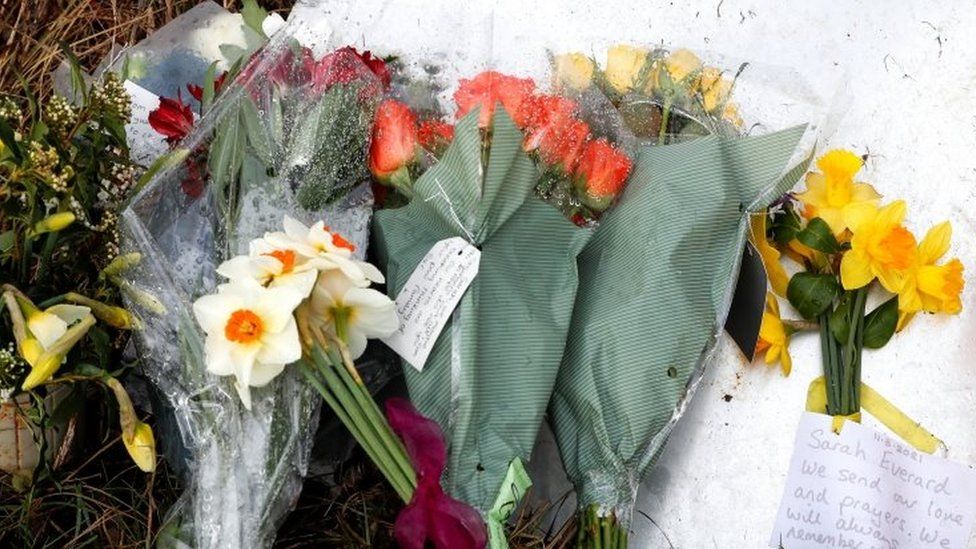A High Court judge refuses to intervene in the action against the police ban on the event.

image copyrightReuters
Organisers of a vigil planned for Sarah Everard in south London are still hopeful it can take place, despite effectively losing a High Court challenge against a ban on the event.
But the Metropolitan Police urged people to find a “lawful and safer way” to express views on women’s safety.
Earlier, a High Court judge refused to say the event would be permitted under coronavirus regulations.
Organisers Reclaim These Streets said discussions with police would continue.
The organisation said in a statement: “We are now in discussions with the Met to confirm how the event can proceed in a way that is proportionate and safe – our number one priority.”
Commander Catherine Roper of the Met Police said the force’s message to those wishing to attend vigils was “stay at home or find a lawful and safer way to express your views”.
She added: “I understand this ruling will be a disappointment to those hoping to express their strength of feeling, but I ask women and allies across London to find a safe alternative way to express their views.”
However, one of the group’s barristers, Pippa Woodrow of Doughty Street Chambers, told the BBC the police statement was “premature”.
“The ball is now effectively in the Met’s court to tell the organisers how this event can take place lawfully,” she said.
Saturday’s event was planned after the disappearance of Ms Everard, whose body was formally identified by police on Friday, prompted public debate about women’s safety.
The 33-year-old had last been seen alive in Clapham on 3 March, when she was walking home along a main road after visiting a friend’s house.
As well as the vigil on Clapham Common, sister events have been planned for other cities and towns including Cambridge, Cardiff, Leeds, St Andrews and Liverpool.
In the ruling on Friday, Mr Justice Holgate refused an application by Reclaim These Streets for the High Court to make “an interim declaration” that any ban on outdoor gatherings under Covid rules was “subject to the right to protest”.
The judge also refused to make a declaration that an alleged policy by the Met Police of “prohibiting all protests, irrespective of the specific circumstances” was unlawful.
Following the decision, a government spokesman said: “All of our thoughts are with Sarah’s family and friends at this terrible time, and the government recognises why so many women and girls across the country want to pay their respects.
“We are still in the middle of a pandemic, which is why we urge people to do this safely and to continue to avoid mass gatherings.”


Mr Justice Holgate hasn’t quite closed the door on the event going ahead anyway.
That’s because three long hours of legal argument thrashed out the legal principles that the Metropolitan Police should follow.
Critically, the force said it did not have a “blanket ban” on all protests – which meant it accepted it had to take into account the right to protest which is enshrined in human rights legislation.
The judge said: “There may well be further communication between the claimants and the police to deal with the application of the [Covid] regulations and [the rights to protest]. But that is not a matter on which the court should comment.”
What does that mean in practice? Well, we’re now waiting to see whether there are talks – and whether some kind of vigil will be deemed to be lawful after all.

One of the organisers of the south London vigil, Anna Birley, told the BBC the group had “consistently” asked the Met Police “to tell us what would be a safe way to exercise our right”.
Meanwhile, Lana Adamou, a lawyer with the human rights group Liberty, said protest was “the lifeblood of a healthy democracy” and that socially-distanced demonstrations were “perfectly possible”.
“The current restrictions should be interpreted compatibly with our rights enshrined in the Human Rights Act and it is concerning that this hasn’t been reflected today,” she said.
When asked whether the vigil should be allowed to go ahead, Home Office Minister Victoria Atkins said “at the moment the law is as it is”.
She told BBC Radio 4’s Any Questions: “For my own part, I will be standing outside my front door and I will be reclaiming albeit a very small piece of pavement, but I will be standing out there to show my support and my respect and my solidarity with other women at this time.”
At the hearing, the judge said the organisers were told by police that “the vigil would be illegal and that their ‘hands were tied’ by Covid-19 regulations”.
He added that the four claimants “were told that, as organisers, they would be liable to be issued with £10,000 fixed penalty notices”, and could also be arrested.

Mr Justice Holgate said it would not be “appropriate for the court” to make the declaration sought.
He ruled that “the requirements of the law have been clearly stated” in previous court rulings and concluded: “I decline to grant the interim relief sought. But I hope that, in this judgment, I have clarified the application of the law in so far as it is appropriate for me to do so at this stage.”
Lawyers representing the organisers earlier argued the Met’s interpretation of Covid rules goes against human rights law.
But George Thomas, representing the Met, said the event could lead to significant crowds in a central London location, at a time when Parliament’s intention was to not allow gatherings of more than two people for health reasons amid the pandemic.

- Under the current lockdown rules two people can meet for recreation outside, which can include “coffee on a bench”
- From 29 March people will be allowed to meet outdoors, either with one other household or within the “rule of six”
- Police can break up illegal gatherings and issue fines of £10,000 to someone holding a gathering of more than 30 people
- During last year’s restrictions, when Black Lives Matter and anti-lockdown demonstrations took place, police took a hands-off approach to protests
